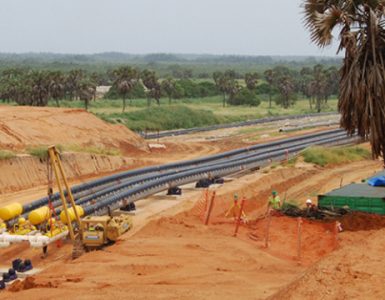At the end of the FY2015/16, the country’s total debt amounted to 53.87% of GDP1. During the same period, domestic debt only accounted for 4.10% of GDP. This meant that 92.3% of the country’s debt was sourced from foreign entities. These numbers are alarming considering the country’s fragile economy and its social challenges. This high percentage of foreign debt leaves the country vulnerable to both exchange rate and interest rate risk. The current political turmoil does the country no favours as it may trigger a credit downgrade and increase the cost of borrowing in the future. While exchange rate movements may widen its foreign debt and further complicate the country’s debt predicament. In an attempt to minimize exchange rate risk, the department of public debt management has advised the government to maintain the right mix of foreign loans by acquiring loans denominated in different currencies. Due to exchange rate fluctuations and the amount of foreign debt the country carries, it is difficult to really measure the country’s total debt.
In 2015, Lesotho had a balance of payments surplus of M1.36 billion (approx. USD 106.8 million)2. The positive balance of the financial and the capital accounts, driven by an increase in capital inflows and foreign direct investment (FDI), overweighed the current account’s negative balance. FDI was largely driven by the construction of the Metolong dam. To maintain or increase its balance of payments surplus, Lesotho has to decrease its imports and attract more FDI. More investment targeted at increasing the country’s local production would help to achieve these goals, along with increasing employment and contributing towards economic growth.
Lesotho is ridden with corruption, poverty and high unemployment. In 2014, the unemployment rate was 41% of the active population3. Around 57.1% (2013) of the population lives below the poverty line. In 2015, Lesotho was ranked 161 in the world in terms of human development index- a holistic measure which considers factors such as education and sanitation. The country’s ranking is a startling indication of the challenges it faces. Lesotho achieved an economic growth rate of 2.5% in 2015, while its GDP per capita was USD 1,056.6 in 2016. The country has to do more to improve its low levels of economic growth, so as to increase its pace of development. Lesotho is among the poorest performing countries globally, as well as on the continent. According to the World Bank, the country is ranked 169th in the world in terms of GDP4.
Lesotho has fallen prey to the cancer of corruption. Corruption hampers economic developments as money that could have been used to either invest in infrastructure, health, education or alleviating poverty is misplaced. Attracting more investment remains paramount to the development process of the country and the government should better its efforts in this regard.
Current Affairs Update
South African Reshuffle to Affect the Loti
The happenings in the South African economy typically have implications for other SADC countries. One such country is the Kingdom of Lesotho. The recent cabinet reshuffle in South Africa, particularly the ousting of the then Minister of Finance, caused the rand to depreciated. The depreciation of the rand means that imports to South Africa will become expensive and imports will likely decrease. This will ultimately lessen Lesotho’s revenue from SACU. Currently, about 40% of Lesotho’s GDP is from SACU revenue, and these developments would negatively impact its GDP.
Lesotho Tries to Diversify its Economy
The Lesotho economy is also heavily dependent on the textile manufacturing sector. There have been calls to diversify the country’s economy, as AGOA access will not be renewed beyond 2025. The Ministry of Trade and Industry has introduced the Private Sector Competitiveness and Economic Diversification Project (PSCEDP) as an intervention to diversify the country’s economy. The World Bank has given additional funding to the project of M170 million (USD 13.2 million). The additional funding will amplify the Ministry of Trade and Industry’s efforts through PSCEDP to support and improve the commercial fruit tree sector, and other sectors. The success of PSCEDP will in turn create much needed jobs and reduce poverty in the process.
Constitutional Challenge Deepen Lesotho’s Political Crisis
A SADC commission has made recommendations to reform Lesotho’s constitution and security. The commission found that flaws in the constitution contributed to recent political unrest in the country. Recently, political parties signed an agreement to open a dialogue to pave the way on how the reforms will be implemented. Had these reforms been implemented sooner, the country would not have had to hold three elections in five years and would have spared significant costs. Political instability discourages investment from foreign entities into the country.
Government Ends Contract with Bidvest
The minister of Finance, Mr Tlohang Sekhamane, announced that the government had opted out of a deal with Bidvest. The South African company had provided the government with a vehicle fleet service for six months, from October 2015 to March 2016. The government is to adopt a new one year vehicle fleet service deal that would see ordinary Basotho providing such a service to the government. Some of the conditions of the deal is that the vehicles provided should have a mileage of less than 30 000 km and comprehensive vehicle insurance. These requirement may prompt some Basotho to take out loans to buy new vehicles. Given that the deal is to run for one year with no guarantee of renewal, some may find themselves in a pool of debt. On the other hand, this deal would be good for the economy as it would provide income to many Basotho.
Worm Outbreak Affects Mafeteng Agricultural Output
In the district of Mafeteng, there has been an outbreak of American Ball Worm affecting agricultural produce. Reports suggest that close to 300 hectares of cultivated land has been greatly affected. Majority of the population in the rural areas of the country depends on subsistence farming for survival, the district of Mafeteng is no exception. If the worm outbreak is not effectively countered in time, the affected region may face a food crisis and the government will be forced to intervene. The government’s budget is tight, as it is prepares for upcoming elections in June. But, failure to address the situation would add to the already deepening poverty crisis in the country.
1 Basotho Ministry of Finance
2 Central Bank of Lesotho
3 Lesotho Nation Development Corporation
4 The World Bank














































